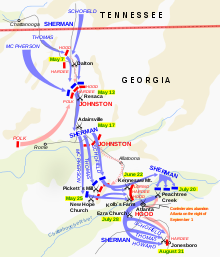Alfred Jefferson Vaughan Jr.
[5] When the Civil War began in 1861, Vaughan chose to follow his home and adopted states and the Confederate cause, despite his strong Unionist feelings.
[6] He raised a company of fellow Mississippians for service, however the state was unable to arm and equip them, so Vaughan led them north to Moscow, Tennessee.
There his men (dubbed the "Dixie Rifles") were added to the 13th Tennessee Infantry Regiment, and Vaughan entered the Confederate Army as its captain that May.
[9] Vaughan's conduct in this fight has been described as: " ...he led his troops in a charge against the Union right, routing an Ohio regiment and causing a nearby battery to abandon 3 of its guns.
Vaughan's most notable service was during the Battle of Chickamauga on September 17–18, 1863, after which he was given a field promotion personally by Confederate President Jefferson Davis "for conspicuous gallantry.
"[6][10] An account of his performance in that fight follows: At Chickamauga he was made brigadier-general on the field, and succeeded to the command of the brigade of Preston Smith, who was killed in that battle.
When he fell, Colonel Vaughan was near his side and immediately took charge of his brigade, and by skill and courage richly earned the honor bestowed upon him by the President of the Confederacy.
He then participated in the Atlanta Campaign of 1864, and on July 4 Vaughan led his brigade during a skirmish at Vining's Station just after the Battle of Marietta on the previous day.
[11] However, in this fight he was severely wounded when his leg was cut off by an exploding artillery shell, ending his active military service with the Confederate States.

